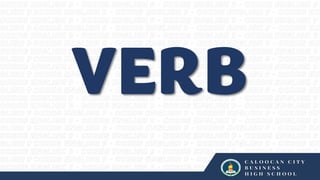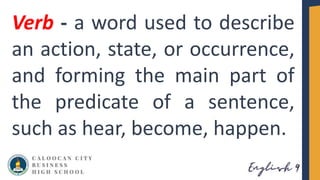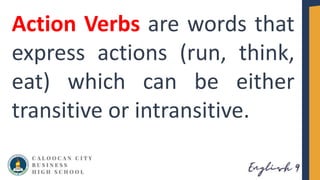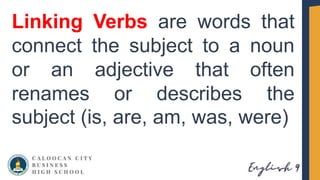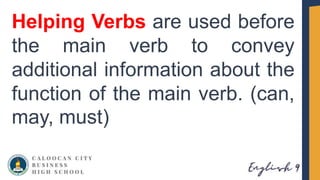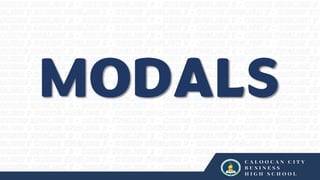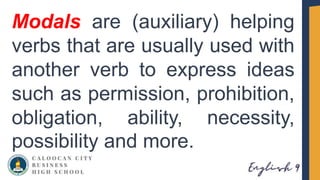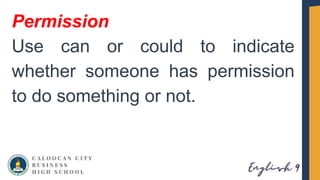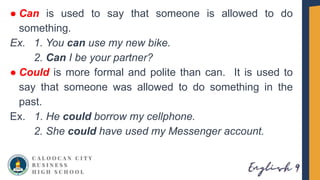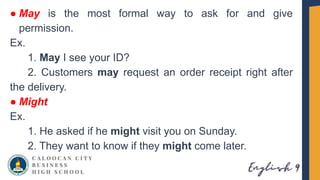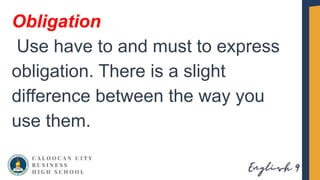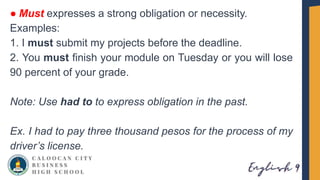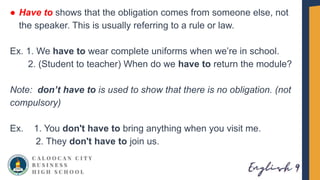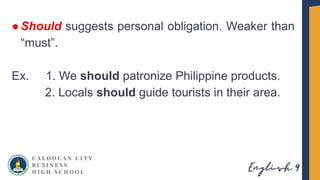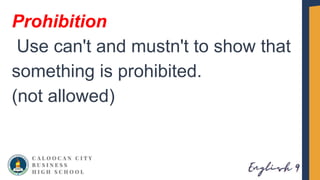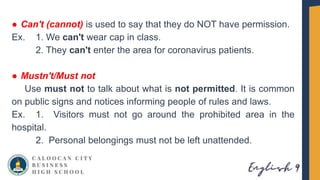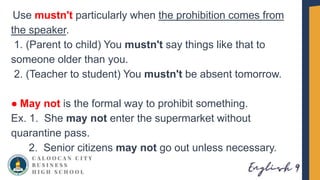1A. VERB AND MODALS.pdf
- 2. VERB
- 3. Verb - a word used to describe an action, state, or occurrence, and forming the main part of the predicate of a sentence, such as hear, become, happen.
- 4. Action Verbs are words that express actions (run, think, eat) which can be either transitive or intransitive.
- 5. Linking Verbs are words that connect the subject to a noun or an adjective that often renames or describes the subject (is, are, am, was, were)
- 6. Helping Verbs are used before the main verb to convey additional information about the function of the main verb. (can, may, must)
- 7. MODALS
- 8. Modals are (auxiliary) helping verbs that are usually used with another verb to express ideas such as permission, prohibition, obligation, ability, necessity, possibility and more.
- 9. Permission Use can or could to indicate whether someone has permission to do something or not.
- 10. â Can is used to say that someone is allowed to do something. Ex. 1. You can use my new bike. 2. Can I be your partner? â Could is more formal and polite than can. It is used to say that someone was allowed to do something in the past. Ex. 1. He could borrow my cellphone. 2. She could have used my Messenger account.
- 11. â May is the most formal way to ask for and give permission. Ex. 1. May I see your ID? 2. Customers may request an order receipt right after the delivery. â Might Ex. 1. He asked if he might visit you on Sunday. 2. They want to know if they might come later.
- 12. Obligation Use have to and must to express obligation. There is a slight difference between the way you use them.
- 13. â Must expresses a strong obligation or necessity. Examples: 1. I must submit my projects before the deadline. 2. You must finish your module on Tuesday or you will lose 90 percent of your grade. Note: Use had to to express obligation in the past. Ex. I had to pay three thousand pesos for the process of my driverâs license.
- 14. â Have to shows that the obligation comes from someone else, not the speaker. This is usually referring to a rule or law. Ex. 1. We have to wear complete uniforms when weâre in school. 2. (Student to teacher) When do we have to return the module? Note: donât have to is used to show that there is no obligation. (not compulsory) Ex. 1. You don't have to bring anything when you visit me. 2. They don't have to join us.
- 15. âShould suggests personal obligation. Weaker than âmustâ. Ex. 1. We should patronize Philippine products. 2. Locals should guide tourists in their area.
- 16. Prohibition Use can't and mustn't to show that something is prohibited. (not allowed)
- 17. â Can't (cannot) is used to say that they do NOT have permission. Ex. 1. We can't wear cap in class. 2. They can't enter the area for coronavirus patients. â Mustn't/Must not Use must not to talk about what is not permitted. It is common on public signs and notices informing people of rules and laws. Ex. 1. Visitors must not go around the prohibited area in the hospital. 2. Personal belongings must not be left unattended.
- 18. Use mustn't particularly when the prohibition comes from the speaker. 1. (Parent to child) You mustn't say things like that to someone older than you. 2. (Teacher to student) You mustn't be absent tomorrow. â May not is the formal way to prohibit something. Ex. 1. She may not enter the supermarket without quarantine pass. 2. Senior citizens may not go out unless necessary.

